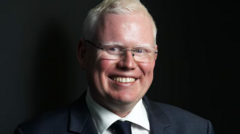At this year's Avignon Festival in southern France, anticipation peaked for the premiere of "The Pelicot Trial," a theatrical exploration of a case that has gripped the nation. The play, set in a medieval convent close to the courthouse, focuses on Gisèle Pelicot's harrowing confrontation with her ex-husband and the 51 men charged with raping her while she was incapacitated.
French playwright Servane Dècle and Swiss director Milo Rau collaborated to present this four-hour dramatization of a four-month trial that has profoundly impacted the national dialogue surrounding sexual violence. In a decisive conclusion, all defendants were found guilty, with many charged with rape, placing issues of consent and accountability under the spotlight.
Ms. Dècle emphasized that the production stems from Pelicot's insistence on transparency; she chose not to seek a closed-door trial and demanded that the videos documenting the rapes, filmed by her husband, be publicly shown to confront the reality of sexual violence.
Attendees lined up outside the theater, with many women hoping to gain insight into how the play would interpret such a profound trauma. For some, the performance served as a space for personal reflection on their narratives of sexual abuse. One audience member, art therapist Nathalie Le Meur, noted a notable shift in male attitudes regarding accountability since the trial's coverage, suggesting that their previously unchallenged behaviors might now lead to legal repercussions.
As the curtain rises on "The Pelicot Trial," it promises to spark significant conversations on the broader societal issues of sexual violence and the urgent need for change in perceptions and responsibility.

















